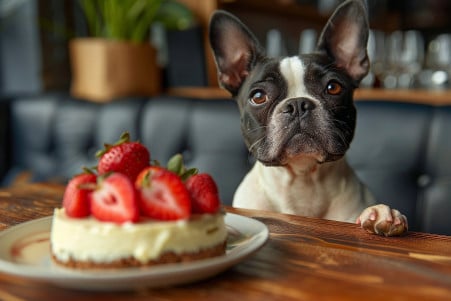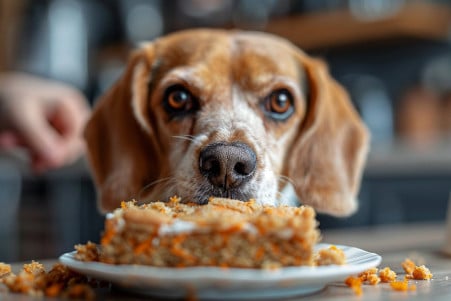Can Dogs Eat Cupcakes? The Sweet Truth About Risks
7 June 2024 • Updated 5 June 2024

If you’re a dog owner, you probably enjoy giving your pet a special treat every now and then. But can dogs eat cupcakes, or are these sweet confections dangerous to our furry friends? While dogs can technically eat cupcakes in small quantities as an occasional treat, they are not recommended. Cupcakes are high in sugar, fats, and other unhealthy ingredients that can lead to obesity, diabetes, pancreatitis, and other health problems in dogs if consumed regularly.
In this article, we’ll take a closer look at the most recent veterinary studies and dietary recommendations to find out exactly what it is about the ingredients and components of cupcakes that make them a concern for pet parents. By learning more about why dogs should steer clear of cupcakes as a staple of their diet, you can make better choices that will help you keep your dog healthy and happy while still letting them enjoy the occasional taste of frosting.
Can dogs eat cupcakes?
Dangerous Ingredients in Dog Cupcakes
Cupcakes often include chocolate, nuts, and raisins, all of which are toxic to dogs and can lead to a range of health issues. As noted by Dogster, the most worrisome ingredients in cupcakes are sugar, dairy, wheat, nuts, raisins, and chocolate, all of which dogs have trouble digesting and metabolizing.
Chocolate is especially concerning because it contains theobromine and caffeine, which are both toxic to dogs. Even small amounts can cause vomiting, diarrhea, increased heart rate, tremors, and seizures, and the danger increases based on the type and quantity of chocolate in relation to the dog's weight.
However, chocolate isn't the only danger. Xylitol, an artificial sweetener, is also toxic and can cause vomiting and low blood sugar. In addition, high levels of fat and food dyes may be harmful to dogs. While a small taste of frosting is unlikely to cause problems, the ingredients in cupcakes make them an unhealthy choice as a treat for dogs and one that could be dangerous if a dog eats a significant amount. Instead, it's best to stick to healthier dog-friendly options.
Homemade Dog Cupcake Recipes
While traditional cupcakes are not safe for dogs to eat, dog owners can make their own 'pupcakes' using ingredients that are safe for dogs. According to Taste of Home, popular pupcake ingredients include whole wheat flour, peanut butter, bananas, applesauce, pumpkin puree, and Greek yogurt. These ingredients are packed with fiber, protein, and healthy fats and are free of any toxic or harmful additives.
As Crazy for Crust points out, pupcakes can be tailored to dogs of different sizes and can be topped with dog-friendly frosting like peanut butter or mashed banana. Love From The Oven notes that making homemade pupcakes allows dog owners to know exactly what's in their dog's treat and make a special, healthy snack for their dog. Meanwhile, If You Give a Blonde a Kitchen shares a recipe for pumpkin peanut butter pupcakes with a yogurt frosting.
How to Make Dog Cupcakes Healthy
Even though homemade pupcakes are a healthier option than traditional cupcakes, they should still be considered a special treat and fed to dogs in moderation. According to Kevin The Berner, serving sizes are based on the dog's weight and can range from 1 cupcake for small dogs to 4 cupcakes for large dogs.
Love Swah recommends feeding pupcakes no more than 2-3 times a week to prevent dogs from consuming too many calories, fats, and sugars. And, as High Hopes for Pets points out, overeating any kind of treats, including dog-safe ones, can lead to weight gain, gastrointestinal upset, and other health issues in dogs. Therefore, pet parents should work with their vet to determine how many treats and how often they should be given to their dog based on their pet's individual dietary requirements.
Symptoms of Chocolate Toxicity and When to Go to the Vet
If a dog eats a regular cupcake, especially one that contains toxic ingredients like chocolate, it's important to watch for signs of poisoning. According to Wagwalking.com, symptoms of chocolate poisoning in dogs include vomiting, diarrhea, increased heart rate, restlessness, muscle tremors, and seizures.
The symptoms will vary based on the type and amount of chocolate that was eaten and the weight of the dog. As mentioned by the Veterinary Emergency Group, mild symptoms can occur 6-12 hours after ingestion, and severe symptoms can last up to 72 hours and will require immediate medical attention.
Pet Poison Helpline explains that if a dog experiences any symptoms after eating a cupcake, it's important to call a veterinarian or pet poison control hotline immediately so that the dog can receive the proper care and treatment. Getting medical help as soon as possible is important for treating chocolate poisoning and avoiding serious complications.
Other Dog Treats to Consider Instead of Cupcakes
While homemade pupcakes can be a fun and occasional way to treat your dog, there are many other options for treating and bonding with your furry friend. According to Dogster, fresh fruits and vegetables like carrots, apples, and blueberries are great low-calorie, healthy options for dogs. Hepper also says that lean proteins like cooked chicken or turkey can be used as a delicious training treat.
If you want to give your dog a treat that can offer more than just a reward, dental health or joint support treats can be a good option, as mentioned by The Dog Bakery. In the end, the best treats for your dog are those that meet their specific dietary requirements and offer them the nutrients they need without the sugar and other unhealthy ingredients.
Conclusion: Occasional Pupcakes Are Fine in Moderation
While regular cupcakes are dangerous for dogs due to their toxic ingredients, homemade pupcakes can be a safe and healthy treat when given in moderation. Pupcakes made with ingredients like peanut butter, bananas, and whole wheat flour can be a good source of nutrients and can be a safe alternative to chocolate and sugar.
That said, it's important to make sure that even healthy pupcakes are given in moderation and in a portion size that's appropriate for the dog's size and dietary needs. That's because, like any treat, overeating pupcakes can lead to obesity, gastrointestinal issues, and other health problems in dogs.
By being aware of the dangers of regular cupcakes and the best way to give homemade pupcakes as an occasional treat, dog owners can make sure their pets are healthy and happy.


